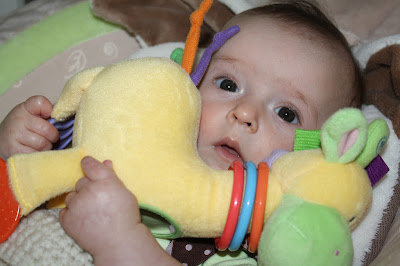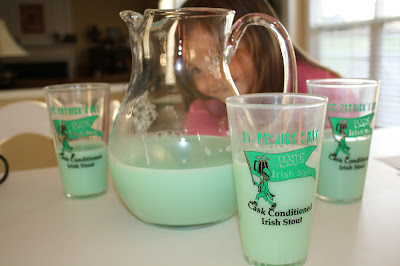I recently read this great article online about
teaching your children the faith. It was in US Catholic magazine, so "the faith" in that case was specifically Roman Catholic Christianity, but I thought it was great advice for parents of all traditions. The biggest takeaway for me was this quote:
“I always ask [parents], ‘Articulate the three most important values in your life that guide you individually or as a family.’ . . . If you can’t articulate your values, how do you communicate them to your kids?"
I started thinking, and pretty quickly had three values that I feel guide me and that I hope we can instill in our children: Compassion, Gratitude, Faith.
Compassion
Caring for others, especially those less fortunate, is a central value of our family. When we pray at dinnertime, we try to always remember people outside of our immediate family, and I hope that Matt and my conversations that our kids overhear instill a concern for the poor and marginalized of society.
As Kate (and later, Claire) gets older, we increasingly try to involve her in activities focused on helping others. On maternity leave, I signed up several weeks to make the sack lunches we send with the homeless men who stay the night at our church on Wednesday nights. (Nashville has a program called Room in the Inn; folks can gather at a certain place downtown to meet vans that will take them to various churches in the area for dinner, sleep, and breakfast, October through March.) I figured I wouldn't sign up for any more weeks once I was back to work, but the very week I went back, they announced Sunday morning that no one had signed up to make the lunches that week, so I thought, "okay, Kate and I can do it together this week!" rather than me doing it on my own during the day. So I made a little shopping list with marker drawings of the foods we needed to buy, and we went to the grocery after work/school, came home and made the sandwiches together and Kate went down the assembly line putting a sandwich, chips, water, fruit, and cookies in each bag.
We talked about how we were making these for "the men who sleep at church." (She's familiar with them because they eat with us at the Wednesday night dinner.) "Why do they sleep at church?" she asked. "Because they don't have houses and refrigerators with food and all that like we have," I told her. "We're so lucky to have a house and food and everything we have, so we need to help them." It was amazing how in my mind the example was "therefore we make lunch for them," but Kate's response was, "We need to help them find houses?" Even though I'd consider myself more holistic in social justice than just isolated acts of charity, I was still struck to the core by the obvious way Kate assumed that we shouldn't just give them food, we should help remedy the problem.
I'm not great with this value. I struggle to be loving toward people who are different from me. I'm ashamed of how judgmental and prejudiced I can be. But it is definitely something I am always striving toward and that I want to instill in my children.
Gratitude
Gratitude, I'm a little better at. I am very fortunate and certainly take a lot for granted. But I do find myself standing in awe, many times, at all we have and the fact that we have it. I open our pantry and think how fortunate we were to have that food. I get in the shower and think how amazing it is that we have a room dedicated to bathing and have hot water whenever we want it. It's mind-blowing, if you think about it. I am so thankful to have our house and to have it be ours. I think of my grandparents whenever I give thanks for our home because it was the savings they left behind that enabled me and my cousin to purchase our homes. We are so, so fortunate.
Like any parent, I try to get Kate to say "please" and "thank you," and she does especially well with the thank you, even from the time she was just doing baby sign language for it. Lately, she has developed a habit that I just love. She often asks me, when playing with a toy or looking at clothes in her closet, "Who gave me this?" I love it because it shows an awareness that all she has didn't just appear out of nowhere. Her grandparents, our friends, and people in our church are extremely generous with her, and I love that she seems not to take it for granted. She asks who gave her something, I tell her, and she responds, "oh. That's very nice of them."
My mom drilled it into me to always write thank you notes, and while I realized the double standard somewhere during my teen years that kids were expected to write thank yous but adults rarely did, I've kept up that practice as an adult. I'm trying to get Kate involved in the practice as well now, and while of course she can't write, I mix in one or two of the following as a way to make her aware of the importance of expressing gratitude when one receives a gift:
- having her be present while I'm writing the notes, addressing the envelopes, etc.
- having her choose which stamp should go on each envelope
- having her color a picture to include in the note (or color on the card or envelope itself)
- having her choose which picture each person gets
- asking her what she thinks about the gift so we can say something personal from her. We tried this with her birthday thank yous and she often just said "thank you," or "I like it," but it's still a good practice, I think, and will grow gradually to the point she can write the whole note herself.
Faith
Compassion and gratitude are both related to our faith, certainly, but the faith itself is also a key value (as you can certainly practice compassion and gratitude even without being a person of faith). There will come a time, of course, when our children will have to claim the Christian faith for themselves, but we make it known to them that, as a family, we are Christians. We baptized our girls because they belong to God even before they can understand or choose it for themselves, and we are promising to raise them to know God and live like Jesus.
At this age (Kate's, that is) we try to help form her Christian identity by talking about why we go to church ("to praise God and learn about Jesus," I typically phrase it) and we pray together at dinnertime. Kate often wants to be the "prayer person" (which is apparently what they call it at school, because she told me today "I'll be the prayer person; you be the line leader") and she'll have us repeat after her,
God is great, God is good,
let us thank him for our food
by his hands, we are fed
thank you, Lord, for our daily bread
In Christ's name, Amen.
When I repeat after her, I'm sure to enunciate, so that if she's just going rote, she can understand better what we are saying, and I remind her that "Christ" is another name for "Jesus," since she knows who Jesus is but probably does not understand the messiah concept or the Greek word for it.
We believe questioning is a good thing, and doubt is not to be feared or squashed, so by instilling "faith" as a value, we certainly do not mean blind acceptance of a particular doctrine. Rather, it is an overall orientation toward God, a desire to seek and know him. There are plenty of theological things I don't understand (or maybe even believe) but I am committed to the journey of faith, and hope our children will be too.
I have a well-known prayer by Thomas Merton hanging by my desk, and there are two lines that I cling to, when I don't know much else:
"... the fact that I think I am following your will does not mean that I am actually doing so. But I believe that the desire to please you does in fact please you."
I hope to instill in my children that desire to follow, please, and know God, and pray that that desire in itself helps them along that journey of faith.
What would you say your top three life-orienting values are?














































